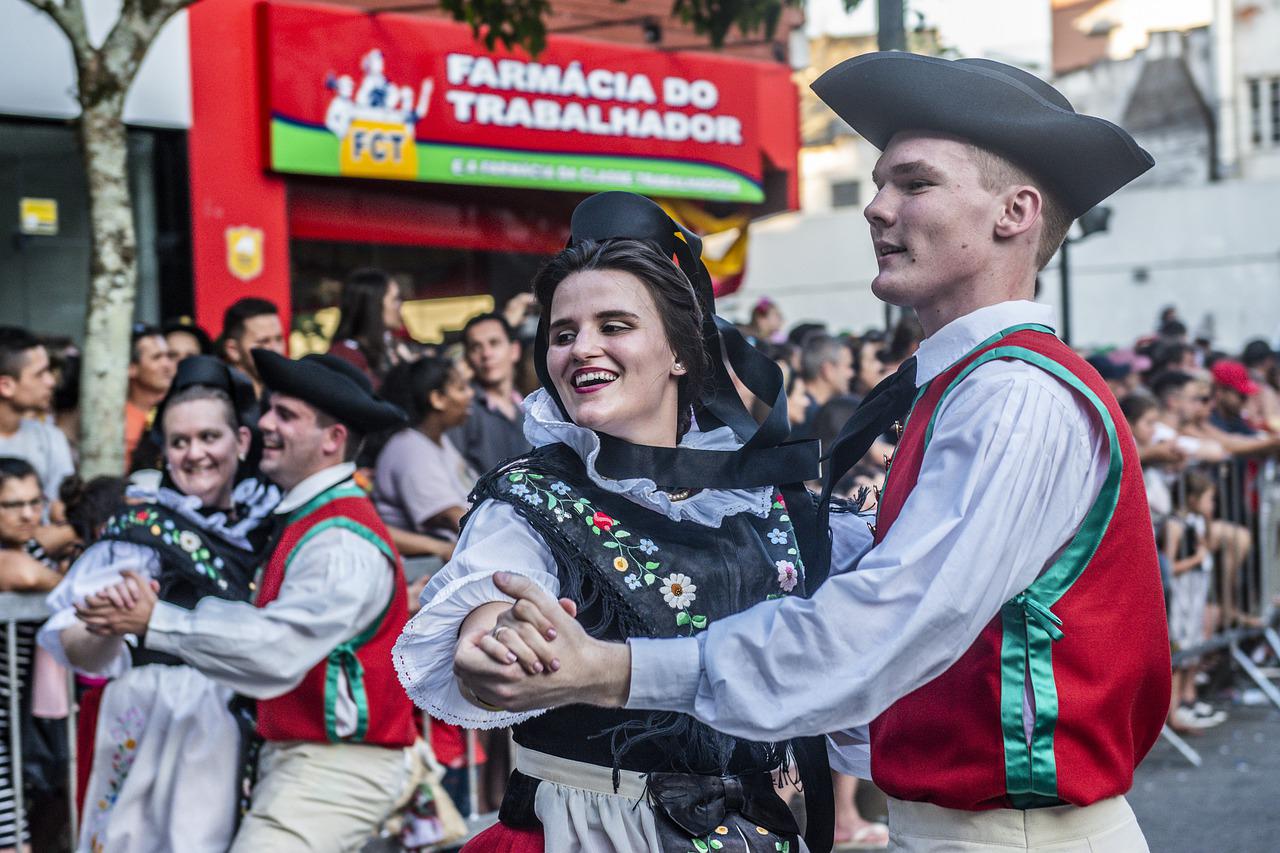Image: Soualexandrarocha on Pixabay
In this post we’ll look at lots of action verbs that will come in handy when you’re talking everyday life.
Onde você vai? Where are you going?
Let’s start with a bunch of verbs to talking about coming and going: ir (a pé, de carro) to go (on foot, by car); andar to walk; vir to come, partir / deixar to leave; chegar to arrive; sair to go out; entrar to enter.
- Eu vou trabalhar de carro. Eu vou trabalhar a pé.
I go to work by car. I go to work on foot. - Nós andamos / caminhamos no parque todos os domingos.
We walk in the park every Sunday.
- Quem vem a festa este fim de semana?
Who’s coming to the party this weekend? - (Eu) geralmente saio tarde do trabalho.
I usually leave work late. - O trem chega às 10:00 da manhã.
The train arrives at 10am. - Eu saio com meus amigos.
I go out with my friends. - Eu nunca vou ao parque à noite.
I never go in the park at night.
À que horas você acorda? What time do you wake up?
Now let’s see some verbs that you can use to talk about your daily routine: acordar to wake up; tomar banho / tomar uma ducha to take a shower; tomar banho (de banheira) to take a bath; vestir-se to get dressed; vestir uma camisa to put on a shirt; tirar a roupa / despir-se to get undressed; tirar as calças to take off pants; escovar os dentes to brush your teeth; lavar as mãos to wash your hands; tomar café da manhã / almoçar / jantar to have breakfast/lunch/dinner; ir para cama to go to bed; dormir to sleep.
- Acordo cedo durante a semana, e acordo tarde nos fins de semana.
I wake up early during the week, and l wake up late on the weekend. - Eu sempre tomo uma ducha de manhã. Eu nunca tomo banho de banheira.
I always take a shower in the morning. I never take a bath. - Eu me visto rapidamente.
I get dressed quickly. - Ela veste uma malha de lã quando está frio.
She puts on a sweater when it’s cold. - Eu tiro a roupa antes de ir para cama.
I get undressed before bed. - Ele tira os sapatos dentro de casa.
He takes off his shoes in the house. - Escovo os dentes depois de comer.
I brush my teeth after I eat. - Lavo as mãos antes de comer.
I wash my hands before I eat. - À que horas você geralmente vai para cama?
What time do you usually go to bed? - Quantas horas você geralmente dorme?
How many hours do you usually sleep?
Ele fala bastante. He talks a lot.
Here are several general verbs that you can use in daily life. falar to speak; conversar / falar to talk; dizer to say; entender to understand; aprender to learn; estudar to study; dar to give; fazer to make; pegar / tirar / levar to take; perguntar to ask; responder to answer; abrir to open; fechar to close; usar to use; pegar / levantar to pick up; por / colocar to put.
- Quantas línguas você fala?
How many languages do you speak? - Falo com meus amigos todos os dias.
I talk with my friends every day. - O que ela está dizendo? Eu não estou entendendo.
What is she saying? I don’t understand. - Crianças aprendem muito na escola.
Children learn a lot in school. - O que você estuda na universidade?
What do you study at university? - Eu dou um presente a minha amiga no aniversário dela.
I give my friend a present on her birthday. - As crianças fazem presentes para os seus pais.
The children make gifts for their parents. - Você pega o metrô ou o ônibus de manhã?
Do you take the train or the bus in the morning? - Crianças fazem muitas perguntas.
Children ask a lot of questions. - O professor / A professora responde às perguntas.
The teacher answers questions. - Ela abre a porta.
She opens the door. - Ele fecha a porta.
He closes the door. - Você usa uma caneta ou um lápis?
Do you use a pen or a pencil? - Eu pego as minhas sacolas / malas.
I pick up my bags. - Eu geralmente ponho as minhas chaves na gaveta.
I usually put my keys in a drawer.
O que você está comendo? What are you eating?
Now let’s look at some verbs that you can use to talk about typical situations at home: comer to eat; beber to drink; cozinhar to cook; limpar to clean; lavar as louças to do the dishes; lavar roupas to do the laundry; guardar as louças to put away the dishes; assistir TV to watch TV; escutar música to listen to music; ler to read; relaxar to relax; deitar-se to lie down; sentar-se to sit down; levantar-se to stand up.
- Como muito arroz.
I eat a lot of rice. - Você toma café ou chá de manhã?
Do you drink tea or coffee in the morning? - Você cozinha muito bem.
You cook very well! - Limpo o meu apartamento aos sábados.
Faço faxina no meu apartamento aos sábados.
I clean my apartment on Saturdays. - Lavamos as louças todas as noites.
We do dishes every evening. - Ele lava roupa aos domingos.
He does laundry on Sundays. - Nós guardamos as loucas quando elas estão limpas.
We put the dishes away when they are clean. - Você assiste/ Vocês assistem TV todas as noites?
Do you watch TV every evening? - Escuto música todos os dias.
I listen to music every day. - Leio na cama todas as noites.
I read every night in bed. - Relaxamos nos fins de semana.
We relax every weekend. - Eu me deito às tardes.
I lie down in the afternoon. - Nós nos sentamos na sala de estar.
We sit down in the living room. - Ele se levanta e sai do quarto.
He stands up and leaves the room.
Estou comprando comida. I’m buying food.
Here are some common verbs related to shopping: comprar to buy; ir às compras to go shopping; procurar to look for; encontrar / achar to find; pagar to pay; custar to cost; experimentar to try on; gastar dinheiro to spend money; sacar dinheiro de um caixa automático to withdraw money from an ATM; economizar/ poupar dinheiro to save money.
- Compramos comida no supermercado.
We buy food at the supermarket. - Fazemos compras todos os fins de semana.
We go shopping every weekend. - Estou procurando um par de sapatos novos.
I’m looking for a new pair of shoes. - Sempre encontramos algo interessante nesta loja.
He always finds something interesting in this store. - Você paga com dinheiro ou cartão de crédito?
Do you pay by cash or credit card? - Quanto custa aquilo?
How much does that cost? - Sempre experimento as roupas antes de comprá-las.
I always try on clothes before I buy them. - Ela gasta bastante dinheiro em livros.
She spends a lot of money on books. - Estou sacando dinheiro de um caixa automático.
I’m taking money out at the ATM. - Nunca consigo poupar dinheiro porque tudo é tão caro.
I never save money because everything is so expensive.
Onde você trabalha? Where do you work?
Now let’s look at some common verbs you can use at work: trabalhar to work; começar to start; terminar / acabar to end; escrever to write; ligar (telefonar) to call (on phone); enviar / mandar um e-mail to send an email; receber um e-mail to get an email; fazer uma pausa to take a break; ter uma reunião to have a meeting; discutir to discuss.
- Eu trabalho às segundas, terças, quartas, quintas, e sextas. Eu não trabalho aos sábados e domingos.
I work on Mondays, Tuesdays, Wednesdays, Thursdays, and Fridays. I don’t work on Saturdays and Sundays. - A reunião começa todas as segundas às 10 da manhã.
The meeting starts every Monday at 10am. - A que horas termina a reunião?
What time does the meeting end? - Ele escreve muitos relatórios.
He writes a lot of reports. - Eu ligo para os meus clientes.
I call my clients on the phone. - Ela envia muitos e-mails.
She sends a lot of emails. - Ela recebe muitos e-mails.
She receives a lot of emails. - Faço uma pausa à tarde para tomar um café.
I take a break in the afternoon and drink some coffee. - Temos muitas reuniões.
We have a lot of meetings. - O que se discute nas reuniões?
What do they discuss in the meetings?
Estamos nos divertindo! We’re having a good time!
Now that we’ve gotten work out the way, let’s see some verbs that you can use for your free time: divertir-se to have a good time/to enjoy yourself; dançar to dance; cantar to sing; sorrir to smile; rir to laugh, malhar to work out; nadar to swim; correr to run; jogar (um esporte) to play (a sport); tocar (um instrumento musical) to play (a musical instrument); pular to jump; subir / escalar to climb; engatinhar to crawl; andar de bicicleta to bike; dirigir to drive; jogar to throw; pegar to catch.
- Eu sempre me divirto com meus amigos / com minhas amigas.
I always have a good time with my friends. - Vamos aos clubes e dançamos todos os fins de semana.
We go to nightclubs and dance every weekend. - Ela canta muito bem!
She sings really well! - Ele está sempre sorrindo. Ele nunca está triste.
He always smiles. He’s never sad. - Eles/ Elas riem quando estão juntos/as.
They laugh when they’re together. - Eu malho quatro ou cinco vezes por semana.
I work out four or five days a week. - Você nada em uma piscina ou em um lago?
Do you swim in a pool or in a lake? - As crianças correm em um parque infantil / playground.
The children run in the playground. - Nós jogamos beisebol/ basquetebol / futebol.
We play baseball/basketball/soccer. - Eu toco piano / trompete / violino.
I play piano/trumpet/violin. - Os meninos pulam na cama.
The boys jump on the bed. - As meninas sobem nas árvores.
The girls climb trees. - O nenê engatinha no chão.
The baby crawls on the floor. - Nós andamos de bicicleta no parque todos os fins de semana.
We bike every weekend in the park. - Eu dirijo / vou de carro para o trabalho todos os dias.
I drive to work every day. - O menino joga a bola.
The boy throws the ball. - A menina pega a bola.
The girl catches the ball.
Eu cheiro algo. I smell something.
Here are a few verbs related to the senses: cheirar / sentir o cheiro to smell; ouvir to hear; ver to see; experimentar / saborear to taste; tocar to touch; sentir to feel; parecer to seem/appear; pensar to think; acreditar to believe; saber / conhecer to know; conhecer uma pessoa to know a person.
- Sentimos o cheiro de pão fresco.
We smell fresh bread. - Esta flor tem um cheiro muito bom!
This flower smells really nice! - A criança toca em tudo que vê.
The child touches everything he sees. - Você escuta os pássaros?
Do you hear the birds? - Você vê aquela mulher lá?
Do you see the woman over there? - Eu sempre experimento a comida quando cozinho.
I always taste food while I cook. - Esta sopa tem um sabor delicioso.
This soup tastes good. - Como você se sente hoje?
How do you feel today? - Ela parece estar triste com alguma coisa.
She seems unhappy about something. - Você está pensando sobre o que?
What are you thinking about? - Você acredita na explicação dele?
Do you believe his explanation? - O que é aquilo? Eu não sei.
What is that? I don’t know. - Eu conheço a irmã dele.
I know his sister.
Não consigo entender. I can’t understand.
Now let’s look at a few modals and types of verbs that you can combine with other verbs: poder / conseguir fazer can do; saber fazer know how to do; ter que fazer must do/have to do; querer fazer want to do; precisar fazer need to do; começar a fazer start doing; parar de fazer stop doing; continuar a fazer continue/keep doing.
- Você consegue ver a televisão?
Can you see the television? - Você sabe tocar piano?
Do you know how to play guitar? - Tenho que trabalhar amanhã.
I have to work tomorrow. - O que você quer fazer hoje à noite?
What do you want to do tonight? - Preciso estudar. Tenho um teste amanhã.
I need to study. I have a test tomorrow. - Começamos a trabalhar de manhã.
We start working early in the morning. - Eu paro de ler à meia-noite e vou para cama.
I stop reading at midnight and go to bed. - Eles continuam a falar durante o filme.
They keep talking during the movie.
Do you want to learn Portuguese?
Check out our other posts on Portuguese language, Brazilian culture, and more. And if you’re looking for convenient and affordable live Portuguese lessons with a real teacher, check out The Language Garage Portuguese. Our lessons are given online in a virtual classroom, so it doesn’t matter where you live or work. We can come to you. And we have flexible options, with a free trial so that you can decide if there’s a fit. Check us out!






